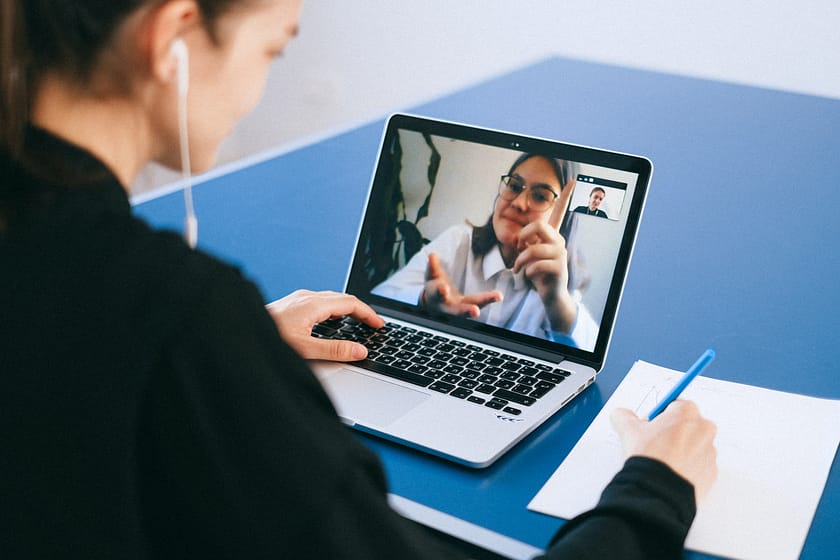Your first job interview can be intimidating. Talking to someone about what you can mean for their company is not something we are trained for in school (well, most of us, at least). It’s a skill that has to be developed by practice and experience, and some key tips and strategies can definitely help.
Because not one job interview is the same, there is no universal solution that guarantees you get the job. However, regardless of the interview that you have, there are several things to remember when preparing for interviews.
1. Research the company and the job description.
Showing that you’ve researched the company before heading into an interview will show that you actually are interested in working there. At a minimum, ensure that you know enough about the company’s history and mission statement so that when asked why you want to work there, you don’t have to say, “Because of the money” or “Because I really need a job.”
You don’t need to be an expert, but you should understand what the company does, its goals, and who its competitors are. If there’s something you’re unsure about, ask your interviewer so that you don’t make a mistake.
Think about how this job fits into your career goals and the skills you want to develop. Think about how it will help you grow professionally and personally.
2. Review your resume.
Before you head off to the interview, take a few minutes to review your resume. Make sure it’s up-to-date and correct any mistakes. You may have worked on it for weeks or even months after finishing high school, but if you haven’t looked at it in a while, take a few minutes to refresh your memory of what you wrote and make sure it still stands for who you are and what you want to do. You might even consider updating your photo or adding one if it’s been a while since the last time you were in front of the camera. Make sure you know the content of your resume when you sit down for the interview.
Your resume should reflect the most recent positions you’ve held and the accomplishments you’ve made. So get creative for your very first job interview: internships, side projects or maybe a charity where you had responsibilities to own up to. They deserve a spot on your resume. Make sure your contact information is accurate and up-to-date as well.
3. Practice answering common interview questions.
You may not know exactly what questions the recruiter is going to ask you, but you can prepare for some potential questions, like salary expectations and your strengths or weaknesses. There are several online websites where you can find sample interview questions, like this (extensive) list of 100 interview questions from Monster. But it might be worth checking out examples of interviews conducted by big tech companies like Google, Apple or Meta because they often contain challenging and abstract questions to test your creativity and thought process.
Take into account the context of your application. If you’re applying for a job posting as an administrative assistant, for example, expect questions about your experience with office equipment and software such as Microsoft Word or Excel.
If you’re applying for a job as a web designer, expect questions about relevant technology like HTML, CSS and JS. Before the interview, think of several interview answers to questions that might come up during the interview so that you’re prepared when they do arise.
Answer all questions clearly and concisely. You can even practice answering questions by saying them out loud in front of a mirror.
4. Prepare questions to ask the interviewer.
Asking questions about the position and the company at the end of the interview demonstrates how serious you are about landing the job. This shows that you are interested in what they say and have thought about how your skills and experience match what they need.
Some interviewers will be impressed by candidates who take the time to prepare questions ahead of time. Here are some examples of good questions:
- Can you tell me about a typical day at this company?
- How do you measure success for this position?
- What kinds of opportunities does this company offer for advancement?
- What are some challenges facing the organization right now?
5. Double-check directions and parking options.
Interview preparation does not only mean having the right documents and information at hand.
If you’re driving to the interview, ensure that you know exactly how to get to the location where the interview will take place. You should also know where to park if there is no dedicated parking lot or garage. Don’t rely on GPS alone — it might not be accurate enough to help you find a new place.
Simple things like making sure your alarm is set at the appropriate time, ensuring that your phone is fully charged, and you have coins to pay for parking are equally important.
If the recruiter conducts the interview via an online meeting, ensure your laptop is charged or plugged in, your camera and mic are working and that you have a stable internet connection.
Ensure your phone is turned off or muted during the interview (and don’t check it during the meeting). This will help keep you from being distracted and allow the hiring manager(s) to focus on what they need from you without interruptions.
6. Make sure you arrive early and bring extra copies of your resume and a notebook.
You probably already have sent digital copies of your resume, but make sure to bring in a few extra copies. Do you have a portfolio that allows for printing and that you can present at the interview? Make sure to do so! If it’s relevant for the job, it will be a nice way to demonstrate your skills to the recruiter.
It’s always a good idea to bring a pen and paper so you can take notes during the interview. Arrive at least 10 minutes early. That way, you have time to relax and perhaps check in on the company website and social media accounts.
7. Be confident and make eye contact.
Your handshake is one of the first things employers notice about you, so make sure that it’s firm but not too firm. Maybe some people will be more reluctant to shake hands given the covid pandemic we faced over the last years. A lot of companies even hold those first (or even all) interviews online. In that case, make sure you have a present and open expression.
In face-to-face meetings, make sure to look your conversation partners in the eyes during introductions and throughout the duration of your meeting. This shows confidence and shows that you’re interested and engaged in the conversation.

8. Make sure you’re dressed for success.
Dress appropriately. Wear an outfit that’s neat and clean; if you’re unsure about what’s appropriate for the company culture, ask someone who works there or look up the company’s dress code online. Be true to yourself and don’t squirm yourself into a three piece suit, if a nice blazer is sufficient and makes you feel more comfortable. Remember that even for an online interview, the same tips apply. Sitting in front of your camera in pajamas is not done.
9. Listen and add to the conversation consistently.
The key thing to remember is that you need to listen carefully during the interview so that you can respond with examples or stories that illustrate your skills, experiences, and knowledge.
It’s also important not to say anything negative about past employers or supervisors — even if they were terrible! If you’re asked why you left your last job, simply say it wasn’t a good fit for either party and move on quickly by asking questions about the position itself and refrain from small talk.
Don’t take any negative comments personally. If there is something negative said during the interview process — whether it’s about your qualifications or even something offhand like “Well, we’ll see how things go” — don’t let it throw you off course or distract from the positive things being said about you. Just keep moving forward with confidence; everyone has an opinion!
10. Ask about the next steps and when you can expect a response from the company.
Ask questions about company culture and benefits packages before accepting an offer. If possible, ask about how much vacation time employees receive, what kind of paid holidays are offered, and whether any other perks are included with employment at this company.
Most companies will let you know when they will get back to you with feedback or if they will be contacting other candidates as well. If this is not the case, you can ask for an approximate timeline.
If it does take longer than expected for them to respond, keep in touch with them every couple of weeks until they get back to you. It’s always better to make sure that they haven’t forgotten about you rather than being disappointed after waiting several weeks without hearing anything back from them!
11. Ensure your own follow-up.
Sending a thank-you message within the next few days, even if you don’t hear back from the employer for a while if often appreciated. A thank-you message is an invaluable way to make a good impression on potential employers and show that you’re serious about the job opportunity. It also reminds them of who you are and why they liked you in the first place. Don’t use a form letter or email template — make sure your note is personalized and thoughtful.
Take it away!
The crucial factor for achieving success in any type of interview, whether it is conducted over the phone, online, or in person, is to be well-prepared. By following the tips we’ve shared above, you’ll be able to give yourself the best possible chance for success. And that’s what landing your first job is all about.
Regardless of how prepared you are, remember that job interviews often aren’t black and white. And, like so much of the real world, they also require an understanding of gray areas. One tip will not solve every problem you encounter in an interview. What it will do, however, is make a strong first impression.




